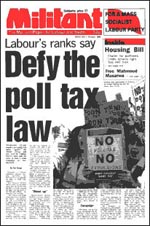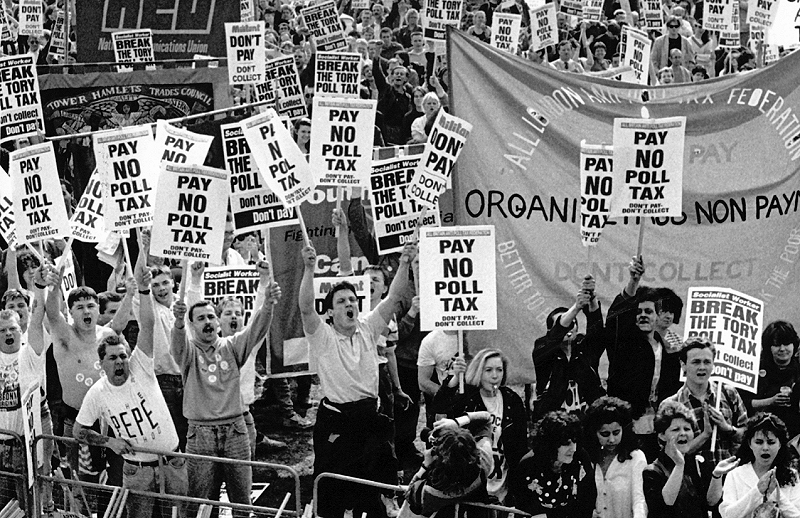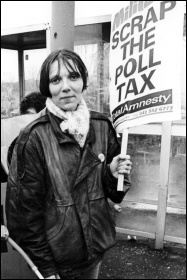Launching the battle in Scotland
Ronnie Stevenson, Socialist Party Scotland, previously secretary Mount Florida Anti-Poll Tax Union, Glasgow
Margaret Thatcher was dubbed the Iron Lady. She wore this description with pride as, like her successors today, she ruthlessly tried to solve British capitalism’s difficulties by launching brutal attacks on the working class.
But she was not invincible as the socialist-led Liverpool City council of 1983-87 and the All-Britain Anti-Poll Tax Federation demonstrated.
Some common themes unite these organisations – a clear set of demands, a clear strategy to achieve them and the involvement of the mass of working class people in active defiance and socialists playing a leading role.
Thatcher introduced the poll tax in Scotland first. It was a standard charge on rich and poor alike. It was levied on each person over 18, including the unemployed, students and those with no personal income at all, who had been exempt from the poll tax’s precursors, the rates. In fact a rich person could end up paying far less than a poor family.
Militant, predecessor of the Socialist, pointed out: “The Thatcher family in Dulwich will save £2,300 per year… an average family in Suffolk will pay an extra £640.”
Defiance

Militant newspaper – Defy the Poll Tax law
In 1987 supporters of Militant organised a conference in Scotland. This followed discussion throughout the ranks of Militant supporters in Scotland, England and Wales about what kind of programme and organisation was needed.
At the conference, Glasgow Labour councillor Chic Stevenson moved that we begin to organise for total defiance of it.
These decisions shaped the campaign over the next few years. The ideas of a mass campaign, for building anti-poll tax unions, for non-compliance by local authorities and council trade unions, for mass organised non-payment and for industrial action to defend those victimised for non-payment or non-implementation were brought together in a Militant pamphlet in April 1988.
Militant began to set up anti-poll tax unions and then federations. These attracted thousands of people to meetings.
The Strathclyde federation was set up in July 1988. Vice-chair Chic set the tone: “I’m having nothing to do with Thatcher’s poll tax.
“I am voting against Glasgow district council setting its part of the tax at £92 per person, along with five other councillors.
“A mass non-payment campaign will still have to be organised. It has the support of local Labour parties and the mass of people in the housing schemes.
“With that support, Labour councils could make the poll tax inoperable if they called on people to refuse to pay.
“It is not the job of Labour councils to do the Tories’ dirty work. I was elected to fight Thatcher, not to bow the knee to her poll tax.”
Against this background the Scottish Anti-Poll Tax Federation was set up and the All Britain Anti-Poll Tax Federation in November 1989.
The initial community meetings consisted of explaining the tax and the collection methods, including the forcible methods which could be used, and then moving on to how to defeat the tax.
When it was explained the difficulties the state would face in collecting the tax if the mass of the people refused to pay, support for non-payment gathered apace.
But, one by one, the councils in Scotland began to bow the knee. When people did not pay, Sheriff’s Officers were sent to get the debts paid.
This was Labour at its worst – all talk and posing but no action other than sticking the boot into the poor.
Involving masses of the non-payers in activity was a key part of the strategy. There were marches and demonstrations.
The first large one was the Scottish Federation organised demonstration in Glasgow on 18 March 1989.
More than 10,000 people attended. A ‘Red Train’ came up from London with 600 on board. Coaches came from all over England and Wales. The poll tax non-payment army was here.
Occupations
There were many innovative features of the campaign – occupations of council offices and Sheriff’s Officers’ offices. Sheriff’s Officers’ cars became well known and they were constantly hounded.
There was a week-long hunger strike in George Square, Glasgow, to highlight the plight of the poor having to choose between paying the tax and feeding their bairns.
There were mass demonstrations outside the homes of people threatened with ‘poindings’ (labelling of possessions for selling to pay debt).
Very few poindings actually took place but the sale of possessions became the scene of one of the most famous episodes in the poll tax struggle.
The Sheriff’s Officers had given up even trying to arrange the sales in their normal salerooms and they set up a sale in the courtyard of a court.
A young Tommy Sheridan, secretary of the Scottish Anti-Poll Tax Federation with a very strong base in Pollok, was served with an interdict, banning him from doing anything to stop the sale.
In defiance he organised hundreds to be there and ripped up the interdict as he led them into the courtyard.
The police read the writing on the wall and instructed the Sheriff’s Officers to cancel the sale.
That way of recovering the debt became unworkable and arresting bank accounts, wages and benefits became the weapon of choice of the state.
Tommy was jailed for six months for breaching the interdict. From there he stood in elections for the council and parliament.
He achieved a fantastic vote in the parliamentary election and was elected as the first Scottish Militant Labour councillor in Glasgow.
The mass defiance spread to England and Wales where Militant spearheaded the mass non-payment campaign.
Many others were jailed including the late Terry Fields, the Militant supporter elected Labour MP for Liverpool Broadgreen. As defiance spread, the Tories realised that the poll tax was finished.
On 31 March 1990 50,000 marched in Glasgow. After speaking in Glasgow Tommy Sheridan flew down to London to address the 200,000-strong demo there.
Much was made of the violence in London but the size and composition of the demo and the growing mass defiance was the real reason for the backing down by the Tories.
By the end, 18 million were not paying – an army which could not be resisted, even by Thatcher.
The 40,000 strong demo in London in October 1990 greeted the young people who had marched from all over Britain spreading the message.
In November 1990 Thatcher was forced to resign as prime minister, a victim of the campaign to abolish the tax she had introduced.
The fight to defend the non-payers continued for many years after that.
The last two large demos in March 1991 in Glasgow (15,000) and in London a few weeks later (50,000) were an indication of that determination to continue. The Tories brought forward plans for a new local government tax.
Labour’s response to this victory was to attack those who resisted. They began to expel Militant supporters who had led the fight to get rid of it.
When the question was posed: ‘Whose side are you on?’ they made it clear – the bosses and the Tories.
The struggle against the poll tax is a landmark in the history of working class activity in Britain. It is full of stories of innovative actions, heroism and solidarity which makes me proud to have been part of a working class capable of such a mass act of defiance.
We in the Socialist Parties in Scotland, Wales and England are proud of the part we played in leading such a resistance.
Isle of Wight 1 June 1990: The mass campaign comes to court
Alison Hill, Previously secretary South-East Hants and Isle of Wight anti-poll tax federation
When you’re fighting an unjust law or government attack, you can’t tell at the beginning of the campaign how every detail is going to work out. You have to engage in the battle and build from there.
Once the mass campaign of poll tax non-payment took off we knew the government would have to fight back somehow.
When Medina council on the Isle of Wight issued thousands of court summonses in May 1990 we had a fight on our hands.
1 June was our day in court and we spent the weeks leading up to that persuading as many people as we could to turn up on the day.
This was a big operation, for a start we had to raise a lot of money so people could pay the ferry fares to get to the Island to help out.
On the day, the court was surrounded by hundreds of people – who listened enthusiastically to the speakers from the anti-poll tax federation.
Sonia Branson, a member of Ryde anti-poll tax union told the Militant at the time that the demo was: “Marvellous, absolutely marvellous!…
“If it wasn’t for Militant we wouldn’t have had this here. I think the Militant people have actually done a marvellous job to get this organised.”
The old-fashioned court room was packed with press. The magistrates’ bench was high up so they could intimidate those below.
Initially we had a hard job encouraging people to speak up and challenge the summonses. But as more people packed into the court, chinks in the magistrates’ and the council’s armour started to appear.
All day long you could hear singing and chanting outside, which built people’s confidence.
Basically we exhausted the court and they gave in over a technicality. They even had to pay everyone’s expenses, which people gleefully lined up to collect.
The Guardian described the court as a “revolutionary tribunal” where it “seemed as if the magistrates and the council were in the dock as defendants and public barracked them”.
You could hear the cheering in Portsmouth as people celebrated the victory. There was still a long way to go but it was a huge blow to the government’s strategy and another step nearer the exit for Thatcher.
The Rise of Militant by Peter Taaffe
£12 including p&p, Available from PO Box 24697, London E11 1YD, 020 8988 8789.
Click here to order online from Left Books
email: [email protected]. Please make cheques payable to Socialist Books












